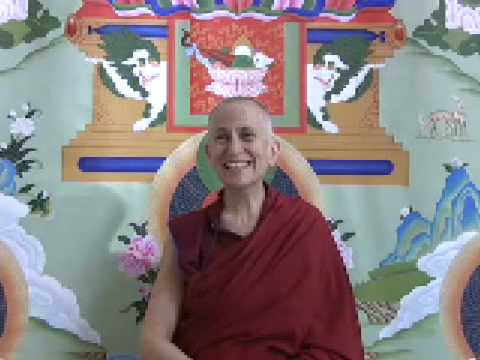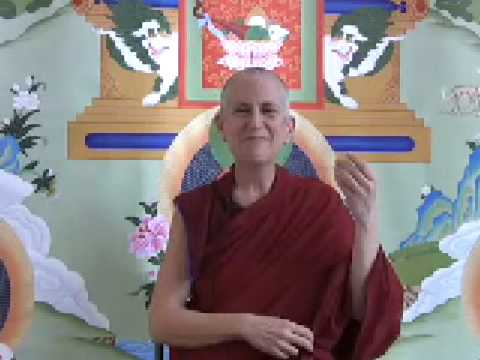Verse 32-3: Renouncing suffering
Part of a series of talks on the 41 Prayers to Cultivate Bodhicitta from the Avatamsaka Sutra (the Flower Ornament Sutra).
- Generating renunciation
- What renunciation means
41 Prayers to cultivate bodhicitta: Verse 32-3 (download)
“May all beings be free from illnesses.”
This is the prayer of the bodhisattva when seeing someone sick.
Another way to deal with the body as it gets sick, as it ages, and when it dies is to see the process of what’s happening as a reason for generating renunciation. This is quite important.
First of all, renunciation doesn’t mean renouncing happiness, it means renouncing dukkha. That’s very important. Most people think “Oh, renunciation. You can’t be happy.” That’s rubbish. You are renouncing dukkha.
Renunciation is so important for everything we do on the path, because without a wish to be free from samsara we might do all sorts of things but it doesn’t become a cause of liberation. At best it can become a cause for a good rebirth if we have that aspiration. But liberation or enlightenment, unless we have that wish to be free, that’s not even part of our motivation.
It’s really important to think about this and have a very intense determination to be free of cyclic existence. You hear me talk about this a lot, how we want to have one foot in both worlds, how we want to tweak our samsara to make it better and at the same time attain liberation and then enlightenment. You can’t do both at the same time. It doesn’t work. They are contradictory. You can’t tweak your samsara—still having in your mind the idea that samsara is gonna bring you ultimate happiness—and at the same time saying, “Samsara stinks and I want liberation.” Those two minds don’t go together at the same place, at the same time.
But that’s what we want! We’re not really convinced we want to be out of samsara, because it is a kind of nice. I mean, there are a lot of nice things and it’s fun. We all have our own things we like, don’t we? You want a relationship, you want to go to exciting places, you want to have a fascinating job, you want to eat special foods you have never eaten before, you want to have a fantastic sex-life, you want everybody to love you, you want to be at the top of your profession and really contribute something to the world so that you go down in all the annuals. What do we get out of it?
It’s really important to have that as something very, very strong in our mind for our Dharma practice to be going anywhere. If we don’t have this, practicing Dharma can still be beneficial because it can help with our daily life problems, and help us to not get so angry, and not have so much attachment and things like that. It will definitely help us with our daily life problems even if we don’t have the aspiration for liberation. But if you want the Dharma to do more then just save you money on going to a therapist (with all due respect for a therapist), if you want it to be more then that, then this idea of being free of cyclic existence is so very, very important. This should be a really strong intention in our mind because that’s what pushes us forward.
Whenever the body is sick, instead of just going “uuuuuhhhhh!” say, “Well, I’m in samsara and samsara means these five aggregates, especially this one here [the body] that is so sick. If I want to be free of samsara, then I have to be free of these aggregates. Then I won’t have this tainted body, and I won’t get sick and old and die.” It’s not like I want to generate renunciation but I still want to hang on to my body. We get into that one too. “Do I want to give up this body? Noooo! It will be impossible. Who am I going to be if I give up this body? How am ever going to have any pleasure if I give up this body?”
Can you see how that fear is so rooted in ignorance and in the ignorance that doesn’t understand what samsara is? The ignorance that doesn’t understand what ignorance is. That doesn’t understand what it means to grasp at an inherently existent self. This body is so much involved with our self-grasping. So much.
If you want to hang on to this body and at the same time realize emptiness in order to be free from the five aggregates, you are again in that contradictory place where the two things can’t go together at the same time. When we think about giving up the tainted aggregates, it’s all we know, and the mind just freaks out, “Oh who am I am gonna be if don’t have these, if I am not these?” That’s why we need to do a lot of purification and create a lot of merit in order to meditate on emptiness. Through that kind of grasping at the aggregates so intensely, how are we gonna realize their emptiness? How are we gonna realize that there is no self that is any or all of those aggregates?
Do you see how all these different things really come together, how we have to approach it from many different angles, and really understand what we trying to do, and confront all the misconceptions in our mind that hangs on to wrong views. We are not even realizing our wrong views. We are so convinced that’s the way the things are.
In your meditation you may sometimes have some glimpse of how stuck your mind is and exactly how many wrong views you hold on to. When you have that glimpse, see it as progress. Instead of going, “Oh, my mind is so ignorant,” say, “Finally I am seeing the ignorance. Haven’t counteracted it yet, but at least I’m seeing it. Thank goodness, because before I couldn’t even tell I was ignorant. I had all my wrong views of reality.” When you start to peal away some of this stuff about what you have been clinging on to so far, really feel very happy and feel like it’s the blessings of the Three Jewels. Because it is! That you’re able to see this, even if you weren’t able to counteract it, just being able to see it.
Venerable Thubten Chodron
Venerable Chodron emphasizes the practical application of Buddha’s teachings in our daily lives and is especially skilled at explaining them in ways easily understood and practiced by Westerners. She is well known for her warm, humorous, and lucid teachings. She was ordained as a Buddhist nun in 1977 by Kyabje Ling Rinpoche in Dharamsala, India, and in 1986 she received bhikshuni (full) ordination in Taiwan. Read her full bio.


